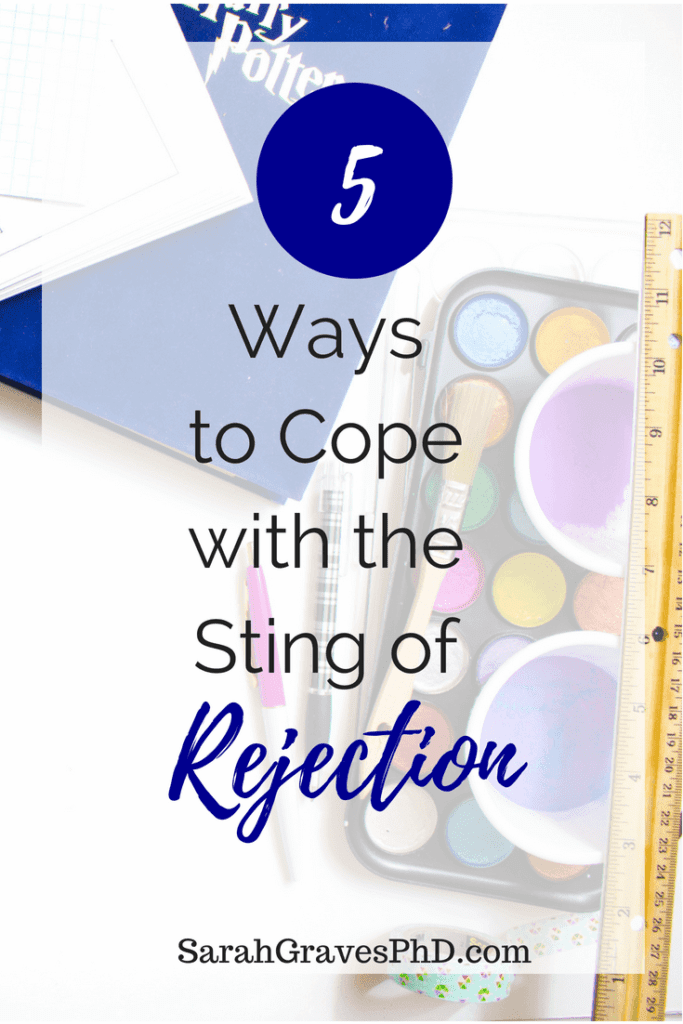Let’s face it: rejection hurts. But if you’re pursuing a career in any kind of creative endeavor, it’s also unavoidable. This makes it especially important to have some kind of strategy in place for coping with rejection’s inevitable sting.
Here are 5 suggestions on how to cope with rejection. And please keep in mind, though I’m going to refer specifically to “writing” for the ease of conversation, feel free to substitute whatever creative endeavor you currently work in. Rejection is certainly universal to all.

1. Realize it’s a normal part of the process.
I’m sure you’ve all heard the story of how Stephen King was rejected 30 times before he was able to sell Carrie, the horror thriller that launched his career into mega-stardom. Likewise, it took J. K. Rowling 12 tries before Harry Potter and the Sorcerer’s Stone was picked up by Bloomsbury.
Rejection, especially if you’re a new writer, is all part of the process. In fact, I recommend doing a complete reframing of how you think about each rejection. Instead of imagining it as some kind of evidence that you’re no good and will never make it as a writer, consider instead that each rejection you collect brings you one step closer to an acceptance.
So, the next time an agent or publisher tells you, “No thanks, that’s not for us,” just think: “One down, 29 more to go.”

2. Realize it’s not personal.
Okay, not having seen the products of your creative endeavors, I’m not going to sit in judgment of them being “good” or “bad.” But there is a world of difference between “That story may not have been good enough yet” and “I’m not good enough.”
The reason rejection hurts as badly as it does is because we make it mean something about us personally instead of just about the work. Maybe the work wasn’t up to par yet; maybe you need to go back to the drawing board with that one.
But that doesn’t mean you’ll never get an acceptance or that your writing will never be good enough. You can always get better. (See #4.) And it sure as heck doesn’t mean you’ll never be good enough.
Another thing to keep in mind: Maybe your work was actually quite good. Creative work gets rejected all the time not because it wasn’t any good but because it just didn’t fit with what that particular gatekeeper was looking for.
I have a theory that writing is like dating. I once dated a man who thought I didn’t care about him enough because I didn’t act jealous and possessive like his ex had. So, he eventually went back to his ex.
For a good while, I just couldn’t figure out what I’d done wrong. Why would he break up with someone who was reasonably psychologically healthy to go back to an obviously crazy person? I was convinced that I had somehow not been good enough, that his rejection meant something about me personally.
And this is what we do to ourselves all the time when faced with rejection – we make it mean something about who we are.
But it wasn’t true that I wasn’t “good enough.” The truth was that he and I were never the right fit. There wasn’t anything at all “wrong” with me; we just weren’t a match. (And, incidentally, it’s so easy to see that now, so many years later when I am happily married to my best friend.)
Writing is no different. Your work may be excellent, and you might still get rejected. If you’re submitting a short story to a magazine, maybe it was just the wrong magazine. Try another one.
And if you’re searching for an agent, there’s no question it’s exactly like dating. No amount of reading those little blurbs on websites or in agent “yellow pages” about what that individual is looking for will really tell you what they’re looking for.
You want an agent to be excited about representing you, to read your work and think: “Hell, yeah, I want to represent this novel!” And there’s just no other way to find that “chemistry” than to ship your work, hope for the best, get rejected, and repeat. So, yeah, exactly like dating.

3. Adopt a Growth Mindset.
I’m one of those rare people who’s always known what she wanted to be when she grew up. And I don’t say this to brag, rather quite the opposite. Despite knowing all my life that I was born to be a writer, I have been derailed from that path so many times, that it’s only now in my 40s that I’m really starting to buckle down and get serious about writing.
I see writers out there all the time that are making a living with their art and are so much younger than me. Worse, so many times their stories go something like, “I never knew what I wanted to do, but I was good at writing, so I tried it, and here I am.”
Every time I hear a story like that, I can’t help but think to myself: What is wrong with me that I am so far behind?
The simple answer to that question is that I’ve let fear knock me off course time and again. And the fuel for that fear has been the belief “I’m not good enough.”
The thing is, though, no one ever starts out an expert. In fact, when you first start anything new, chances are you will probably suck at it.
Even Stephen King wasn’t born a master writer. (If you’ve never read his On Writing, I recommend getting your hands on a copy. In it he talks about getting continually rejected and how rejection actually improved his writing.)
Unlike Stephen King, however, I never allowed myself room for growth. Because I believed I had to be good from the get-go, I never showed anyone my work, fearing that I was not any good at all.
I even went so far as to let it stop me from writing altogether, because I was so disappointed when the words on the page didn’t perfectly mimic the cinematic scenes that played out in my mind.
And because of that, I wasted a lot of years not getting any better.
Adopting a growth mindset is crucial in writing and in life. We have to allow ourselves to start out as amateurs, show others our work, get their feedback, and learn from it. This is how we get better.
With each rejection, just like Stephen King, you have the opportunity to learn and grow. You can realize with each one that your skills might not be there yet, but with consistent practice and dedication, you will get better.
But you can’t do that by never showing anyone your work.
So, never let the fear of rejection stop you. Put your work out there, get feedback, don’t take it too personally, and use it to make your work better. Then rinse and repeat.

4. Keep in Mind: Rejection May Hurt, But It Won’t Kill You.
When you get rejected, you might genuinely feel like you’re going to die. And, of course, on an intellectual-level we know this is ridiculous. But on an emotional level, it’s actually not.
Humans are social creatures, and rejection can often feel like a “social” death, which makes us feel like we don’t matter, we don’t belong, and no one likes us. And there’s actually a legitimate reason for this.
Because so much of human history involves living in tribal groups, our brains are inherently programmed to think along these lines. Social rejection can mean being cast out, which in the days of hunter-gathers, literally meant being left to die.
And that’s why rejection feels like it might kill us, and why most of us go to great lengths to try and avoid it.
So, if a rejection ends up making you feel like this, keep in mind that although the hurt is real; it won’t actually kill you.

5. Don’t Take Too Long to Lick Your Wounds.
It can be tempting after receiving a rejection to take a break. And it actually might be a good thing to take a little bit of one depending on how much the rejection hurts. If you’ve been at this a while and are just feeling exhausted and burnt out from rejection after rejection, it’s probably a good idea to do something else for a moment.
It’s never a good idea to try and just “power through it,” if you’re genuinely feeling some hurt. Burying emotions never helped anyone. So take a pause and feel your feelings.
Just don’t take too long. There’s a difference between allowing yourself to feel something, and letting the fear of further rejection take over.
Two things to keep in mind when it comes to fear: The first is that its sole purpose is to keep us safe. But a lot of our fears aren’t actually serving any useful purpose.
Back to those hunter-gatherer days: We have lingering, left-over programming that has us fearing all kinds of things that might have once harmed us, like rejection.
The job of that fear is to keep us “safe” by keeping us in our comfort zones. And the thing that’s particularly insidious is sometimes we don’t even recognize it.
I, for example, have been known to take years to research novels. On the surface, I could justify this to myself as “necessary” to the creative work. But digging a little deeper, I eventually came to see that this was just one more way to procrastinate.
And that’s the real problem. While fear is busy keeping us safe in our comfort zones, it doesn’t allow us to grow, to experience anything new, or to change our lives for the better. No product of artistic expression ever gets to see the light of day when fear is at the helm.
The other thing to remember about fear is that the more you give into it, the stronger it becomes. So, make sure to feel what you feel, but if you find yourself taking weeks, months, or even longer to ship out a new story, novel, or other creative work, it’s time to get back in the game.
Fear can steal years from your life. I’ve been there, and I know it first hand. Take away the power of fear by understanding what it’s doing – trying to keep you “safe” in your comfort zone, realize that rejection won’t actually kill you, and can even be the force for making you better, and keep shipping your work.

In Conclusion
Rejection sucks big-time. No one likes to experience it. Just recently, I received a letter from an editor describing my writing skills as “not up to par.” Ouch. I’m an English teacher and a Ph.D. and here was an editor telling me my writing was not good. Double-ouch.
That’s when I took my son out for some ice cream and sat in the grass while he played in the local splash pad. The sun was shining, the early summer temperature was perfect, and my three-year old little boy was giggling and having the best time smacking the water jets as they sprang from the concrete.
And as I sat there on that beautiful summer evening, I realized that life was still good, and one rejection wasn’t going to change that. Tomorrow I would get up, pour myself a cup of coffee, and get back to writing.
And I have the same hopes for you. Don’t let rejection stop you from pursuing your creative work. Let the work be its own reward, and as you keep practicing and keep getting better, remember – this is all just a part of the process.
Over to you: How do you cope with rejection? What would you add to this list? Let me know in the comments below!

